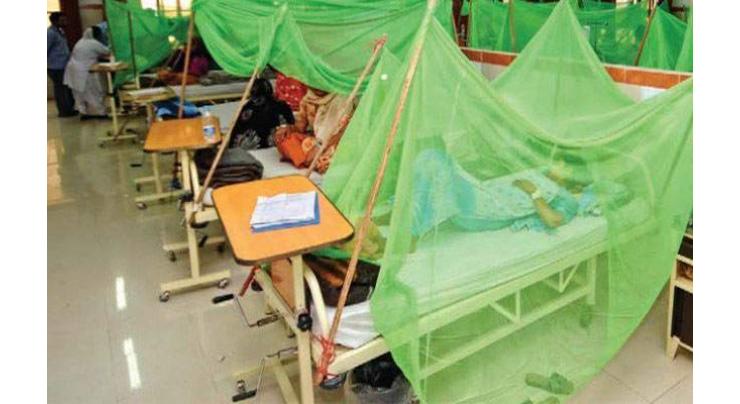
395 Dengue Cases Reported In Current Year: Manager Control Of Dengue Programme
Muhammad Irfan Published April 29, 2019 | 08:12 PM

Manager, Prevention and Control of Dengue Programme, Sindh Health Department, Dr. Abdul Rashid on Monday said that as many as 395 cases of dengue were reported during the current year in four districts of Karachi including East, Central, South and Korangi
Dr. Abdul Rashid who would retire from service on April 30 (Tuesday), addressing a press briefing said that 395 cases had been reported so far from all over Sindh with one death.
He said that four districts of Karachi reported major chunk of cases and those were East (56), Central (48), South (43) and Korangi (19).
Among others district West reported 12, Malir 8, Hyderabad and Larkana 4, Sukkur 3, Mirpukhas 1, Qambar Shahdadkot 1, one each in Matiari, Ghotiki and Khairpur.
About 96.45 percent cases reported in Karachi alone, of them 201 were male and 194 female patients, he mentioned.
The Programme Manager shared that some 2088 cases were reported in 2018 with two deaths.
Dr. Abdul Rashid told that the programme had 129 sentinels sites in province including 43 laboratories, 36 public sector hospitals, 29 DHO's and 21 private hospitals.
He said that due to cooperation of relevant institutions and untiring efforts of Prevention & Control of Dengue Programme, dengue had been controlled at maximum level.
Deputy Programme Managers Dr. Anis, Dr. Jai Parkash, Additional Programme Manager Dr. Abdul Waheed, Environmentalist Babar Mahar and Entomologist Haq Nawaz Chandio were also present in briefing.
Dr. Abdul Rashid told that strong structure of the programme had been formed, which undertake surveillance and case control activities. "We need capacity building of our specialists, doctors, social mobilizer and all other staff to further improve performance of the programme," he said.
Cooperation was needed on continuous basis from other relevant departments including local government, lady health workers, malaria control, district administration and district health officers, he urged.
Dr. Abdul Rashid appealed to the masses to play their role by not allowing stagnant water at homes, streets and areas.
"We have also published and issued progress report of 2018 containingdata and performance of the program," he concluded.
Related Topics
Recent Stories

Wembanyama in France: NBA Spurs to play Pacers in Paris in January

Russian missile kills two in Ukraine's Odesa: governor

Dutch Embassy celebrates King Willem-Alexander's birthday

Need of concrete steps stressed for safe, nutritious milk availability

Scotland's leader Yousaf quits after a year

Services of GDA Pakistan China Friendship Hospital launched

Mining giants Vale, BHP propose $25 bn settlement over Brazil dam collapse

Georgia ruling party stages mass rally to counter protests

Bayern ready for 'extraordinary' Bellingham, says Tuchel

PTI leaders get interim bail

Tennis: ATP/WTA Madrid Open results - 2nd update

French actor Depardieu released after sexual assault questioning
More Stories From Health
-

Vaccines save at least 154 million lives in 50 years: WHO
6 days ago -

UHS to issue MBBS degrees within three months after final result
6 days ago -

Rawalpindi woman gives birth to six babies
11 days ago -

DC calls for intensive anti-polio drive in ICT
12 days ago -

World Hemophilia Day observed to underscore importance of providing comprehensive care
12 days ago -

Six in a family with heart on the 'right side'
12 days ago
-

Diabetic disease increasing rapidly : Dr. Noor Elahi Memon
13 days ago -

World Hemophilia Day observed
13 days ago -

ATC dismisses bail petition of doctor involved in illegal kidneys transplant
20 days ago -

Dr. Shehzad warns against deviation from WHO guidelines on anti-smoking
21 days ago -

Health activists express concerns over attempts to derail tobacco control
23 days ago -

UHS declares MBBS first prof, MS urology exam results
1 month ago











